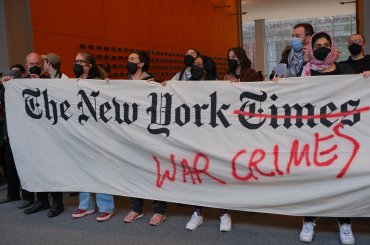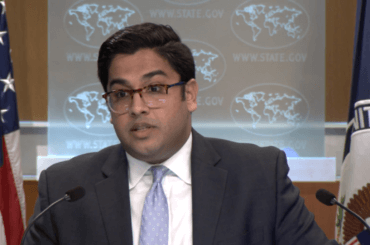Studies have shown that most Americans just read the headlines and don’t bother clicking on the story.
This is concerning on its own terms, but it’s especially frightening as it relates to the U.S. media’s coverage of anti-Zionism and antisemitism.
WWE star’s ‘likes’ of antisemitic posts cause firestorm—but no sanctions, declared a recent one from Israel Hayom. The short piece also found a home on Jewish News Syndicate’s website.
Invoking the possibility of sanctions implies that something truly terrible was endorsed, but the story makes it clear that was not the case.
Sami Zayn is a Muslim wrestler whose parents were Syrian immigrants. He’s criticized Israel’s treatment of Palestinians before and has been consistently targeted by pro-Israel groups over it.
The big “antisemitic” post that liked this time around is an article by Chris Hedges about Israel’s plans for Gaza. Among other things, the piece actually criticizes the Israeli government for attacking Jewish people. “Israel, at the same time, is turning on ‘Jewish traitors’ who refuse to embrace the demented vision of the ruling Jewish fascists and who denounce the horrific violence of the state,” writes Hedges. “The familiar enemies of fascism — journalists, human rights advocates, intellectuals, artists, feminists, liberals, the left, homosexuals and pacifists — are already being targeted.”
Zayn’s other indiscretion was liking a post where a Twitter user said Israel’s killing in Gaza was “calculated and deliberate.” The article doesn’t cite any example of this, implying that it’s a lie. So here’s one: in October Human Rights Watch concluded that two Israeli strikes in Lebanon, that killed Reuters journalist Issam Abdallah and injured six other journalists, intentionally targeted civilians.
In short, Zayn never liked an antisemitic post. He shared and liked posts about Israeli policy.
You may have heard about a recent controversy that erupted at an Oakland coffee shop. A woman complained to the staff about graffiti that she found in the bathroom at Farley’s East, then tried to reenter the bathroom to document it. She was prevented from doing so by the workers. They asked her to leave and said, “Free Palestine” when she did. The woman’s video went viral, the coffee shop shut down for a short amount of time, and the workers were fired. Now the former employees are now criticizing the owner, saying he had known about the graffiti for month.
This is an interesting story, but the details are not entirely relevant to the subject of this newsletter. In this case, I’m interested in how the graffiti has been framed in headlines.
Here’s a small sample:
Oakland cafe workers say owner knew about anti-Semitic graffiti
So, what was the graffiti in question? On the bathroom walls it said “Zionism=fascism” and “Your neutrality is enabling genocide.” Again, where is the antisemitism?
A story at Berkeleyside contains one of the only truthful headlines on the topic: Oakland cafe confrontation over anti-Zionist graffiti leads to staff firings, boycott call
Let’s conclude with this one from the Atlanta Journal-Constitution: Decatur schools staffer still employed after emailing resources on Gaza.
Here’s another one that implies a move so grave that the person should have been fired.
The story? City Schools of Decatur equity coordinator Anthony Downer sent an email to some co-workers providing resources on how they could support the Gaza. The email included an attachment that was effectively a reading list “compiled by a queer collective of Jews, Palestinians, and allies in Atlanta.”
Downer was investigated over the email, which probably shouldn’t be surprising at this point. City Schools of Decatur have stated that he should be removed from his position. I’d like to reiterate that the person investigated for trying to help Gazans is the school’s equity coordinator.
It’s another surreal and ridiculous story, but you wouldn’t know that if you didn’t click.
NYT coverage of anti-Zionism
It’s hard to know where to begin with Jonathan Weisman’s recent piece on antisemitism and anti-Zionism in the New York Times. So let’s start with its confounding opener:
The brutal shedding of Jewish blood on Oct. 7, followed by Israel’s relentless military assault on Gaza, has brought a fraught question to the fore in a moment of surging bigotry and domestic political gamesmanship: Is anti-Zionism by definition antisemitism?
It doesn’t matter how many times you read that paragraph, it will not make sense to you.
“Zionism as a concept was once clearly understood: the belief that Jews, who have endured persecution for millenniums, needed refuge and self-determination in the land of their ancestors,” writes Weisman.
“Clearly understood” is doing a lot of work here. Zionism has always been opposed by many people and was obviously debated in the Jewish community from the beginning. Surely, the author of (((Semitism))): Being Jewish in America in the Age of Trump is aware of this. I think it’s also safe to say that Palestinians who have had their homes stolen didn’t believe that settlers “needed” refuge on land that didn’t legally belong to them.
So we know how Weisman defines Zionism, but how does he classify anti-Zionism?
“If anti-Zionism a century ago meant opposing the international effort to set up a Jewish state in what was then a British-controlled territory called Palestine, it now suggests the elimination of Israel as the sovereign homeland of the Jews,” he writes. “That, many Jews in Israel and the diaspora say, is indistinguishable from hatred of Jews generally, or antisemitism.”
For good measure, Weisman gets a quote from the ADL’s Jonathan Greenblatt in. This is a guy who spends nearly all his time equating anti-Zionism with antisemitism, so the quote he supplies is not surprising: “There is no debate. Anti-Zionism is predicated on one concept, the denial of rights to one people.”



Trying to undo the sins of the nation state within the confines of the nation-state concept is likely to be unsuccessful. Part of what I want to do is to encourage more of us to think about new ways to think and act on this issue.
There must be a permanent ceasefire, not with Palestinians suffering under oppressive conditions, but as a place where all live with peace and equality. It is time for Pope Francis to do more than talk. He must go to Gaza and make a stand for peace and freedom.
Please sign the petition and share widely.
https://chng.it/CRQ7qw4Gzn
This is one small thing we can do. If we can do more, let us do more.
Zionism has never been a Jewish-majority movement.
Why is this still called The Shift if nothing is shifting. Why don’t we call this the Backlash? or The Whip? and spend the Shift posting something positive in moving towards Palestinian expression
By the literal reading of his words, he’s not saying that what “was once clearly understood” was “that Jews, who have endured persecution for millenniums, needed refuge and self-determination in the land of their ancestors“. Instead, he’s saying that what “was once clearly understood” was that this belief was what “Zionism as a concept” was about. In other words, it was understood that people who held that belief were Zionists, and people who did not hold that belief were not Zionists.
However, you may be on to something here: someone who doesn’t read it very carefully may interpret his statement that “Zionism as a concept was once clearly understood” as a statement that the belief itself was widely believed, not just understood as a belief. Think of what would go through your mind if you read this analogous statement: “Geocentrism as a concept was once clearly understood: the belief that the earth is at the center of the universe.“